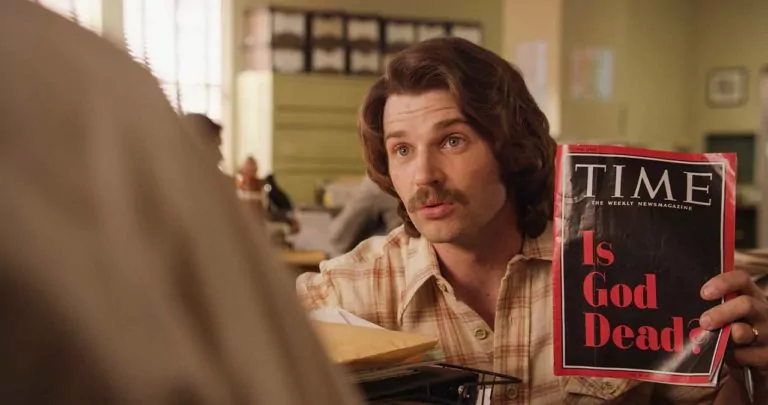Drama
112 minutes / 2017
RATING: 7/10
On a Saturday morning in May, I found myself in an unusual place: seated in the Hoyts cinema, awaiting the start of a film.
Now I must say I never bought into the argument that movies could not be compatible with Christian life. It seemed to me that it depended on what sort of film was being screened. Having said that, I am thankful that, when it came to movies and theaters, I grew up with a sense of restraint. After all, wholesome cinematic presentations are few and far between, and the movie industry has been responsible for much social change that just doesn’t accord with God’s Word and God’s law. That’s why when it came to my own children I told them: “Don’t decide to go to the cinema and then see what’s on offer. Rather, if there’s something that you are confident about that it is wholesome, then make the decision to see it.”
I reflected on those discussions – ones with my own children, and others with my parents when I was a youth – as I quietly waited for The Case for Christ to begin.
A reluctant convert
The Case for Christ is based on a book by the same name, telling the true story of a man, Lee Strobel, his wife and family, who lived and worked in the city of Chicago in the 1980s. The Strobels were a happy family, consisting of a Dad, a Mum, a daughter, and in the course of the film, a son was born to them.
Early in the story whilst out at dinner, the daughter almost chokes to death on a large sweet; it’s the resolute intervention of a black Christian woman that saves the child’s life. Lee’s wife, Leslie, maintains contact with the lady who saved her child’s life and is inspired by the woman’s faith in Jesus Christ. In time Leslie, too, becomes a Christian, much to the chagrin of her atheist husband.
As a journalist committed to the ideal of exposing the truth, Lee decides that the only way to convince his wife that she is throwing her life away is to disprove the fundamental tenets of Christianity. A colleague at work puts him on the right track and astutely suggests that he start by researching the resurrection of Christ.
Armed with this information, Lee sets out to disprove this central teaching of Christianity. He consults colleagues and friends first, then he turns to theologians and historians, psychologists, and eventually a medical doctor. The more he looks, and the deeper he goes, the more he finds to support the resurrection of Christ, rather than disprove it.
The frustration that accompanies this voyage of discovery is interesting and instructive to behold. In the end Lee admits, “OK God, you win!” and it is this that turns him to God in true repentance for his obstinate refusal to accept what was staring him in the face for so long.
Authentic because it is true
I couldn’t help but enjoy the story. It was honest, it was real, it was moving and it was genuine, maybe because it had really happened. It was wholesome too. I appreciated the search revolving around the resurrection of Christ. It resonated beautifully with what Paul says in 1 Corinthians 15:13-14:
But if there is no resurrection of the dead, then Christ is not risen. And if Christ is not risen, then our preaching is empty and your faith is also empty.
I was impressed by the truth uncovered by the research, and by the excellent profound insights afforded by the different characters in the film. These days it’s hard to find movies where the language is not marred by blasphemy and where there is not some sexual overtone; it was wonderful to watch something where this did not – at least not that I noticed – feature.
I also enjoyed the literary qualities of the film. The characters were real and the story was compelling. A second, parallel story, running through the film – Lee’s investigation into the shooting of a cop – provides some excellent symbolism in relation to Lee’s spiritual journey. When Lee stands at the side of the hospital bed of the innocent victim of a miscarriage of justice and apologizes for not seeing what should have been obvious, the man mutters in response, “You didn’t see it because you didn’t want to see.” That was a poignant moment.
Some nits that could be picked
A Reformed critic might argue that the expression used in the film about “inviting Jesus into your life” is an Arminian sentiment, and I would be hard pressed to argue against that. Unless, of course, we see it as an expression of the believer’s response to the work of the Holy Spirit, causing and working faith in Jesus Christ.
It can also be argued that faith shouldn’t be dependent on outside proofs (doesn’t God’s Word testify to its own authenticity?) and that the way to faith Lee Strobel pursues seems to elevate the authority of archeology and experts above the Bible. There’s truth in that criticism too.
But from what we can learn about Lee Strobel, subsequent to the events in the film, it is clear that however his faith began, it has grown to a deep and caring connection with his God. This is a true story, so even if the producers intend it as an account of what we should do, we can choose instead to enjoy it as a record of what God did do.
Still, I couldn’t help but appreciate that in an age where evidence and reason are so central, the facts of the Bible will stand up to rigorous scrutiny; even the rationalist, who might shrink back from a way of faith, is left without excuse.
Summing up about the Case for Christ, I feel comfortable recommending it. With us in the theatre were families with younger children, some teenage youth and a smattering of older people, and it really had appeal for all.
Two cynics
I’m not sure why, but my mind couldn’t help but compare Strobel’s story to another that I had read about, some years before, one that filled me with deep sorrow and wonder. In an interview with Nederlands Dagblad, the ninety-year-old Harry Kuitert, emeritus professor of systematic theology from the Free University of Amsterdam, stated:
I have sought God, but I have not found him.
Harry Kuitert’s story sees him seeking the evidence that God is real, that God gives sense and meaning to life, and that there is life after death, but slowly and surely he comes to the conclusion that none of it stacks up and none of it is true. Nederlands Dagblad quotes Kuitert in the interview as saying:
You cannot conclude that there is a God. … He exists only in your head, he is the product of your thoughts, and outside of your head he doesn’t exist. … Every believer makes his own religion. That doesn’t make it true. You believe because you choose to, maybe because you need to or because you are afraid, or lonely.
If you read the different biographies of Harry Kuitert, you can’t help but stand amazed that a man who started out as being a minister of the Word and later a professor in theology slowly but surely lets go of the foundational tenets of the Christian faith. Throughout his life he reveled in different aspects of theology, but his book titles tell the story of a diminishing faith.
In 1989 he wrote a book titled, The Universally Doubted Christian Faith, a title that served as a parody to what we often confess in church in relation to the Apostles’ Creed, “our undoubted Christian faith.”
In 2000 he wrote a book called About Religion, about which Nederlands Dagblad said:
Till now, for Kuitert God had still been the force or the person behind people’s searching and speaking. In this book, however, God has become the product of man’s imagination. Unabashed Kuitert writes: “I am finished with God as a person, as a being that exists in himself and for himself and that can be invoked through prayer.”
And then, in 2014, he wrote The Church, a Construction Mistake, about which he stated: “Why doesn’t it honestly proclaim that it’s all made up?”
Speaking about Kuitert, Nederlands Dagblad reported:
In the Christian part of the Netherlands Kuitert became a phenomenon: Harry Kuitert, who peeled away the layers of faith, one after the other, until there was nothing left.
Here then is the tale of two cynics (with apologies to Charles Dickens), one who started out refusing to believe but who was confounded by the evidence, and the other who believed and lost his faith because he couldn’t find the evidence that it could be true. You have to wonder how come.
Is this just the outworking of God’s election? No doubt that’s part of the story, but it just won’t do to stop there. For mixed in with God’s election is also our human responsibility and ownership of the truth. What else got in the way of Kuitert? Was it intellectual arrogance, was it human pride – maybe even unwittingly – getting in the way of truth? I wished he could meet the liberated and innocent convict in the hospital who muttered to Strobel, “You didn’t see it because you didn’t want to see it.” May God’s Spirit as yet rip away the self-imposed spiritual blindfold that leaves him an empty and lonely cynic.
*****
EDITOR’S NOTE: If The Case for Christ film inspires you to track down more by Lee Strobel, it’s important to understand that Strobel is not Reformed. That doesn’t come up much in The Case for Christ, because the topic is one all Christians believe – Calvinists and Arminians agree that Christ rose. But in The Case for Faith Strobel turns his investigative skills to the topic of faith, and the result is a book that could have been called The Arminian Case for Faith. In it he repeatedly rejects the Reformed understanding and presents a specifically Arminian answer to questions. So while the film could be a nice evening’s entertainment for you and your family, Strobel shouldn’t be a go-to resource for matters of faith and doctrine.











